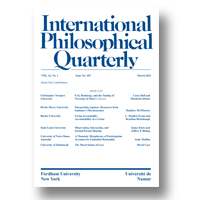|
|
|
1.
|
International Philosophical Quarterly:
Volume >
63 >
Issue: 3
About Our Contributors
view |
rights & permissions
| cited by
|
|
|
|
|
articles |
|
2.
|
International Philosophical Quarterly:
Volume >
63 >
Issue: 3
Joshua Folkerts
A Foundation for a Hegelian Welfare State:
Poverty as a Lack of Self-Actualization and the Right of Subsistence in Service of Freedom
abstract |
view |
rights & permissions
| cited by
In addition to its main theme of freedom, Hegel’s political philosophy addresses the problem of poverty. This article proposes a theoretical foundation for a Hegelian welfare state by demonstrating how its rationale and concepts are derived from Hegel’s political philosophy. Poverty constitutes a fundamental deficiency in the modern liberal state focused on the self-actualization of its citizens. This poverty is not an accidental but a structural factor of modern market society, resulting from economic contingencies. The poor rabble is deprived of the opportunities for self-actualization that market society provides. Therefore, the main task of a Hegelian welfare state is to secure the right of subsistence as a condition of the possibility of self-actualization. Without subsistence citizens are unable to develop and actualize their free will through property formation in market society. Derived from Hegel’s right of necessity and the guiding principle of freedom, the right of subsistence is paramount to the legitimacy of the state. Therefore, it cannot be left to the contingent morality of private charity. The right of subsistence does not only guarantee mere survival, but also includes a minimum of property needed to participate in market society.
|
|
|
|
|
3.
|
International Philosophical Quarterly:
Volume >
63 >
Issue: 3
Lauri Kallio
Ideal Realism—Real Idealism:
The Year 1884 as the End of Organized Hegelianism
abstract |
view |
rights & permissions
| cited by
The paper discusses three talks, which were given at the meetings of the Philosophical Society of Berlin (Philosophische Gesellschaft zu Berlin) in the mid-1870s. In these talks, the principles of some main movements in contemporary philosophy (realism, absolute idealism, critical idealism) were elaborated and contrasted to each other. The paper focuses on the concepts of real-idealism and ideal-realism. All the discussants, Friedrich Frederichs, C. L. Michelet and J. H. von Kirchmann, introduce these concepts. Frederichs, an adherent of critical idealism, argues only for the standpoint of real-idealism. Michelet, G. W. F. Hegel’s personal student and an adherent of absolute idealism, takes real-idealism and ideal-realism to be the two sides of the one coin. Kirchmann, an advocate of realism, regards real-idealism as an objective, and he is skeptical about the possibility to achieve it
|
|
|
|
|
4.
|
International Philosophical Quarterly:
Volume >
63 >
Issue: 3
Mohammadreza Esmkhani, Seyed Masoud Hosseini
Hegel, Davidson, and the Dialogical Character of Knowledge
abstract |
view |
rights & permissions
| cited by
This paper scrutinizes the dialogical character of knowledge from the perspectives of Hegel’s and Davidson’s philosophies. First, it outlines their analogous trains of thought, particularly their “anti-representational” and “intersubjective” accounts of knowledge. Second, it draws a parallel between the two by discussing their contrasting views of the structure and goal of knowledge, showing that while Davidson advocates an open-ended, scheme-less empirical knowledge, Hegel maintains the notion of a (universal-rational) scheme and a goal-oriented dialectical process in which “the true is the whole.” This section then critically traces their underlying disagreement to their divergent views on the nature of meaning, language, and thought. Finally, it argues that their views can be seen as complementary to two versions of dialectic, showing that while Hegel’s approach, akin to Platonic dialectic, focuses on the self-contained and “Truth”-oriented “negotiational” movement of ideas, Davidson’s, reminiscent of Socratic elenchus, emphasizes the truth-oriented ‘conversational’ interaction of subjects exchanging concepts.
|
|
|
|
|
5.
|
International Philosophical Quarterly:
Volume >
63 >
Issue: 3
Masaya Sato
Explicit Performatives and Force Recognition
abstract |
view |
rights & permissions
| cited by
Utterances of explicit performatives, such as “I order you to close the door,” have the forces named by the appearing verbs; here, the utterance has the force of ordering. These utterances utilize declarative sentences, which usually indicate the force of statements, rather than of any verbs contained in them. This leads many to theorize that explicit performatives are statements that cause their hearers to infer the forces they name. This article argues against this account on the grounds that it is based on the false premise that hearers can unconsciously recognize illocutionary forces. Instead, I put forward the account that explicit performatives are nothing but the acts with the forces that they name.
|
|
|
|
|
6.
|
International Philosophical Quarterly:
Volume >
63 >
Issue: 3
Yu Zhang
Why the Embodied Emotion Theory Is Better than the Evaluative
abstract |
view |
rights & permissions
| cited by
Supporters of the Evaluative Judgment Theories of Emotion mainly explore emotions from the perspective of cognitive evaluation and advocate that emotions are evaluative judgments. The Perceptual Theories of Emotion have made some modifications to the evaluative judgment of emotions, attempting to propose better theories. The Perceptual Theories of Emotion advocate verifying the similarities between emotions and perceptions through analogical reasoning. However, the Perceptual Theories of Emotion also have their problems. Compared to the Evaluative Judgment Theories of Emotion and the Perceptual Theories of Emotion, the Embodied Emotion Theory has significant advantages, mainly reflected in avoiding the drawbacks of over-intellectualize emotions by evaluative judgments; infants and animals can also understand emotions through non-conceptualized ways of self-awareness and understanding of social rules and norms; the core relational property of emotions revealed in the embodied emotion theory demonstrates the action orientation of emotions, connects the organism’s body and external environment, and integrates both biological and social aspects, further clarifying the complexity and diversity of emotions.
|
|
|
|





